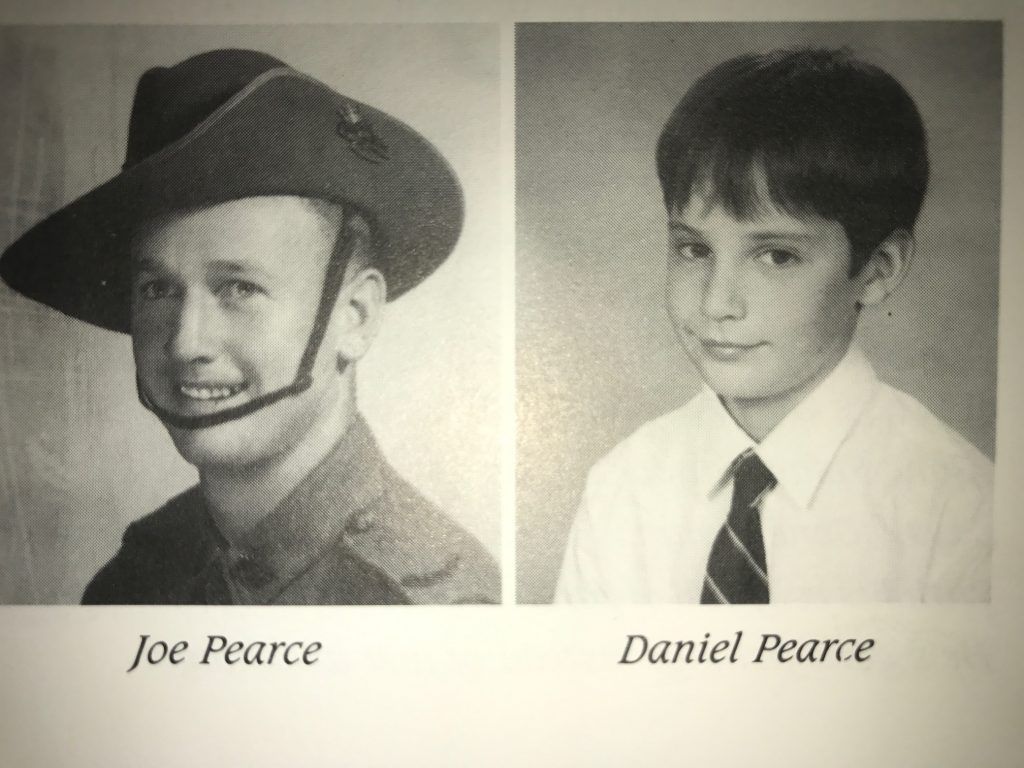Joe Pearce
By Daniel Pearce
The author Daniel Pearce is the grandson of Joe Pearce. He wrote this story for an English assignment while in year 7 at Dumbleyung District High School 1997.
Joe Pearce was born in Wagin in 1917. Joe’s mother was Emma Warren and his father, Thomas Pearce. They had a total of ten children, their names were Winifred, Dorothy, Tom, May, Joe Jack (who sadly died of a brain tumour at age 14), Jean, George, Caroline and Morna.
At the age of six in the year 1923, Joe went to school at Moulyinning, than at the age of twelve he went to North Moulyinning in 1929. He stayed there for years. A special memory is travelling to school each day in the horse and sulky travelling 6 miles in one hour.
Joe immediately started work on the farm, never considering being anything else other than a farmer.
Joe started playing football at Moulyinning at the age of 14 in 1932. There was no Moulyinnning team in 1933 so he played for Kukerin. The following year he played for Harrismith. Moulyinning Football Club reformed and their team won the first premiership ever. This was the year of 1935, following with four premierships in a row. Then he was selected into a carnival team and from here he was selected to play for Swan Districts. Joe played football for Swan Districts for a year, then Second World War broke out.
Joe Pearce joined the army in 1941 and stayed on the farm until he was called up for service. He entered the 2/4th Machine Gun Battalion and trained in Northam for about six months, he then transferred to the cold Mount Lofty Ranges in South Australia. They were then moved to Darwin to build gunposts and roads in Darwin and while there, the Japanese officially declared war.
Then the battalion was moved to Papua New Guinea by ship. When they got to Port Moresby their orders were changed, hence, they were transferred to another larger ship the ‘Aquatania’. Joe and his battalion sailed right around Australia past Sydney and around to Perth where they picked up reinforcements. The they sailed to Singapore and came into the Sundra and Sumatra Straights. There they were transferred into small Dutch boats.
They landed on the coastline of Singapore in heavy rain, this was the 1st of February, the only day the Japanese didn’t raid Singapore so they had no trouble landing. The battalion took up their positions on the beach facing Malaya. They dug gun pits and readied their guns. On the 7th the Japanese started shelling the battalion, continuing for ten hours. The Australians lay low and waited for the major attack, which came on the 8th February. The Australians took a heavy toll on the Japanese numbers but the Japanese had cut them off from the other Australian forces so they had to fight their way out. Their battalion reformed and after heavy fighting for the rest of the week with consistent bombing and strafing from the Japanese Air Force, the Allied commanders decided to surrender to save the population of Singapore. They were told to lay down their weapons on the 15th February 1942 and they were taken prisoners of war.
Altogether the battalion lost 160 men and 340 were injured (there were 960 in the whole battalion). They were imprisoned in Changi Barracks and from there were sent out on working parties all around Singapore. After 10 months, they were sent to build a long railway line in Thailand. The party Joe was in was sent to a place called Banpong in Thailand. The men started the Thailand end of the railway and built it towards Burma. Joe worked on it for three and a half years. Finally, the allied forces over ran Japan and the Japanese were forced to surrender in August 1945. The war was finally over and the allies were free.
Very little had changed in farming while he was gone, but goods such as food, petrol and clothing were rationed and hard to get.
Joe returned very sick and with a weakened body and was determined to get back into football to regain his strength. Halfway through the 1948 season, he resumed his career with Swan Districts. Joe won the Fairest and Best for two years in a row and the club has an Honour Board titled ‘Joe Pearce – Award of Courage’. Joe’s love of football continued when he coached Moulyinning Football Club for twenty years – winning nine premierships in a row and thirteen overall.
Joe met Gwynneth Dow in Perth and married on the 22nd February 1946, the start of their life together. Joe has three children; their names ar Allison, Tracy and Tom who love him dearly. He also has seven grandchildren and four great grandchildren. He and Gwynneth have shared fifty one years of marriage together.
At the age of 82 he is still on the farm. Working on the land with his son.

